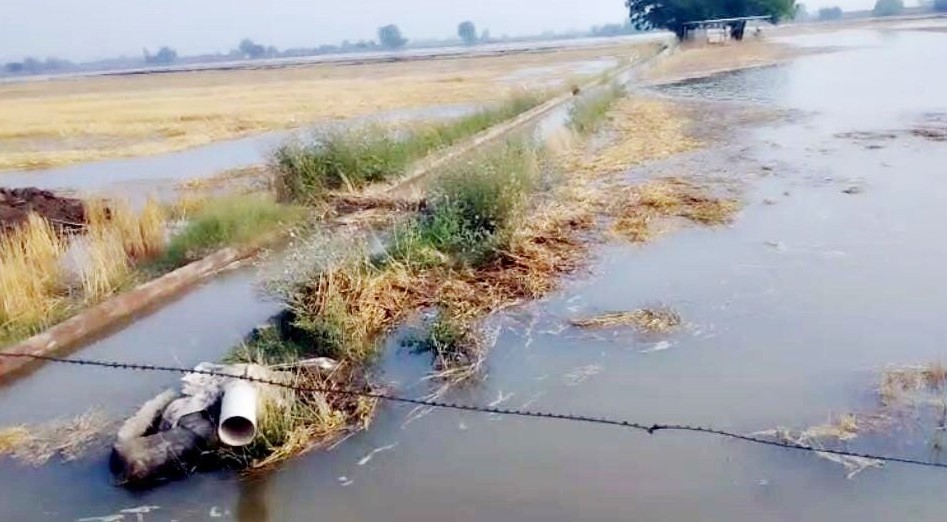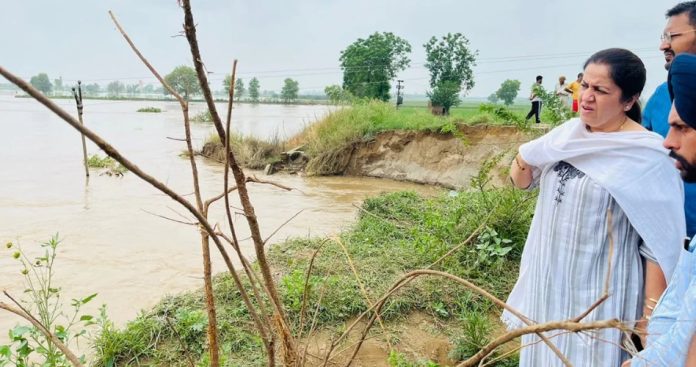The agricultural heartland near Abohar, Punjab, is reeling from the devastating impact of repeated breaches in a crucial canal, leading to the inundation of over 300 acres of fertile farmland. This recurring calamity has triggered widespread distress among the farming community, who are witnessing their crops and livelihoods being washed away by the uncontrolled surge of water. The incidents, occurring in close succession, have not only caused immediate financial losses but have also cast a long shadow over the upcoming sowing season and the overall agricultural prospects of the region.
The latest incident marks the second significant breach in the Lambi Minor sub-canal near Bazidpur Bhoma village, situated approximately 31 kilometers from Abohar, within a mere three-day span. The first breach, which occurred on Saturday following a severe thunderstorm that uprooted a large tree and caused a 100-foot wide rupture in the canal bank, had already submerged around 100 acres of agricultural land. While repair work was reportedly completed by Saturday evening, the relief for the farmers proved to be short-lived.
According to local farmers, the canal embankment eroded once again late on Monday night, leading to the fresh flooding of an additional 200 acres of farmland. This repeated failure of the canal infrastructure has ignited serious concerns regarding the structural integrity of the canal and the efficiency of its management by the irrigation department officials. The farmers allege that the second breach occurred after the Canal Department officials allegedly succumbed to pressure from residents of tail-end villages to release water into the canal, despite the recent damage and the incomplete stabilization of the repaired section.
The consequences of these repeated canal breaches are far-reaching for the agrarian community in the Abohar region. Standing crops, which were nearing harvest or were recently sown for the summer season, have been submerged under several feet of water, leading to extensive damage and near-total loss in many fields. Farmers have reported that their straw bales, essential for livestock feed, have been washed away, further compounding their woes. The flooding has also significantly delayed the sowing of crucial summer crops like cotton and other vegetables, pushing back the agricultural calendar and jeopardizing potential yields.

The timing of these breaches is particularly unfortunate, as it coincides with a scheduled canal shutdown from May 16th for essential maintenance work. This impending two-week halt in water supply will further exacerbate the challenges faced by the farmers, who are already grappling with the aftermath of the flooding and the uncertainty surrounding their damaged fields. The prospect of a prolonged period without irrigation water adds another layer of concern for the upcoming agricultural cycle.
Videos and images of the breached canal and the flooded farmlands have been widely circulated on social media platforms, painting a stark picture of the devastation caused by these recurring incidents. However, as of now, there has been no official statement or comprehensive assessment of the losses from the irrigation authorities or the district administration. This silence has further fueled the anger and frustration among the affected farmers, who are demanding immediate accountability and adequate compensation for the significant financial losses they have incurred.
Farmer unions and local leaders are now calling for a thorough investigation into the reasons behind the repeated canal breaches. They are demanding to know why a recently repaired section of the canal gave way so quickly and are questioning the quality of the repair work undertaken. Allegations of negligence and premature release of water under pressure are also being raised, highlighting the need for transparency and accountability in the canal management system.
The affected farmers are also urgently seeking financial assistance and compensation from the government to help them recover from their losses and prepare for the next sowing season. The destruction of standing crops and the delay in sowing have dealt a severe blow to their livelihoods, and timely financial aid is crucial for their survival and the sustenance of the local agricultural economy.
The repeated canal breaches near Abohar serve as a stark reminder of the vulnerability of agricultural communities to infrastructural failures and the critical need for robust and well-maintained irrigation systems. The incident underscores the importance of regular inspections, timely repairs, and responsible water management practices to prevent such calamities and safeguard the interests of the farming community, which plays a vital role in the state’s economy and food security. The authorities are now under immense pressure to address the immediate crisis, provide relief to the affected farmers, and take concrete steps to prevent the recurrence of such devastating events in the future.


